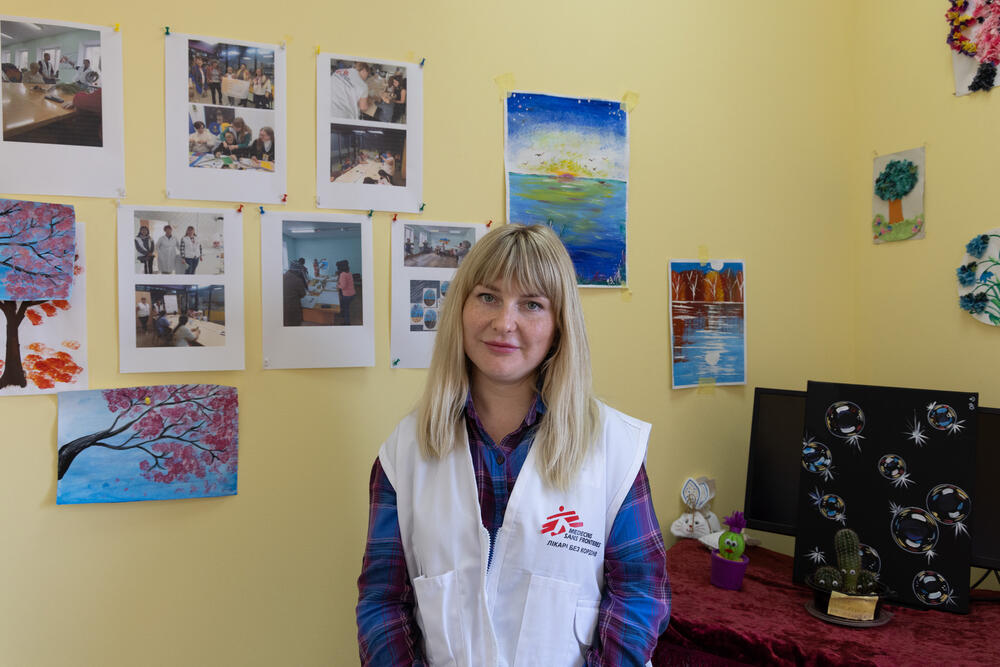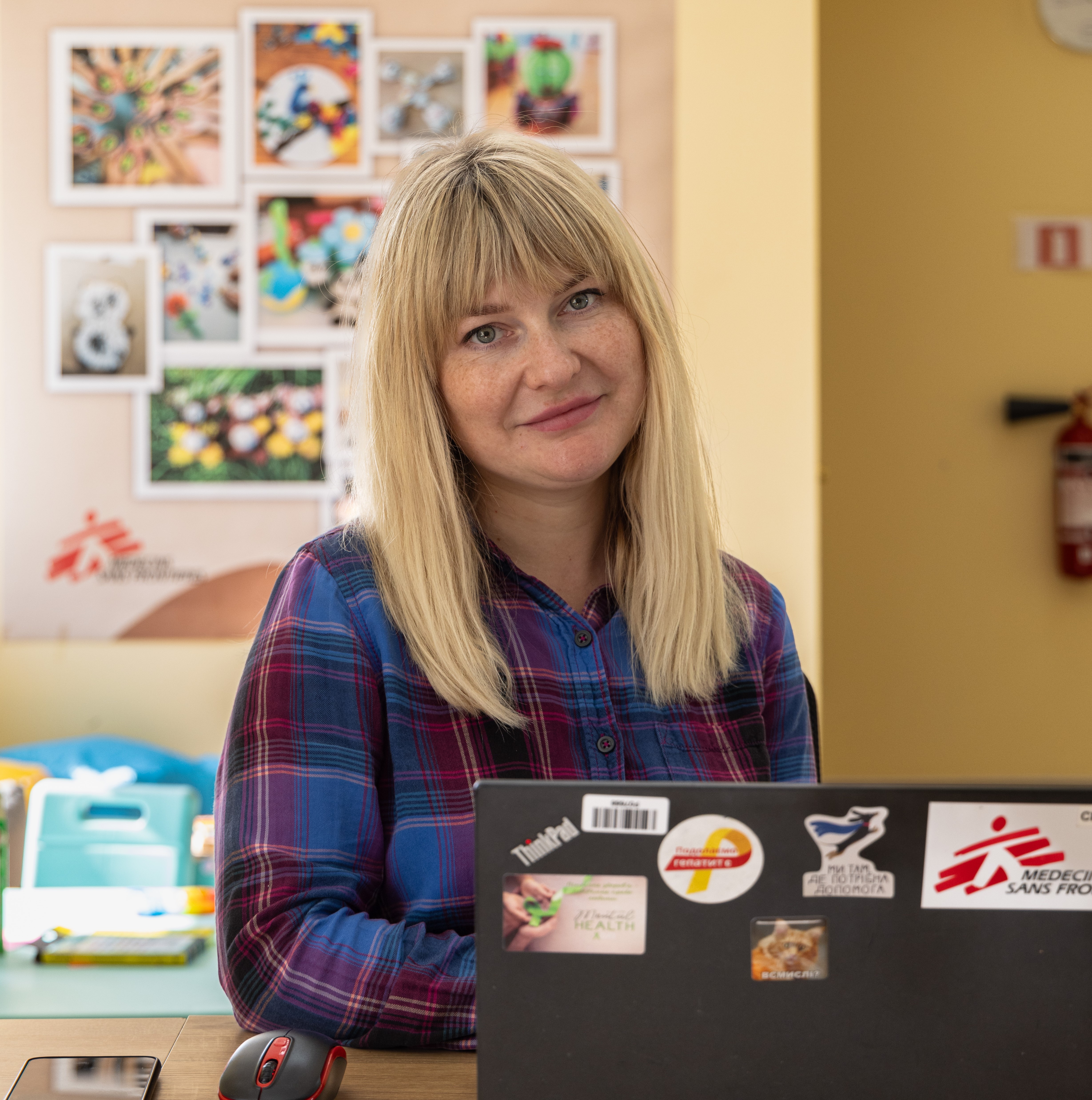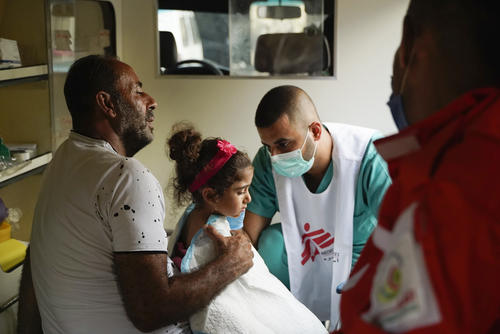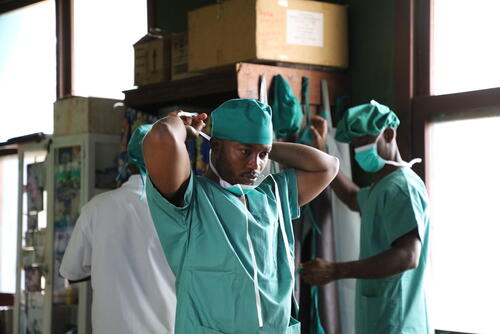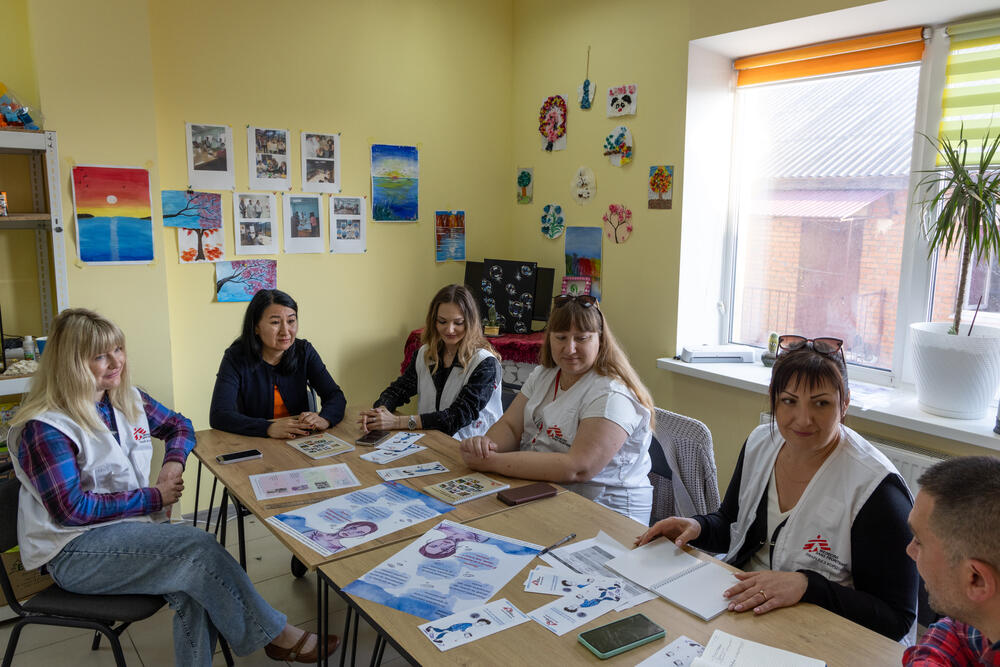Ukraine: Breaking the vicious circle of PTSD
Anastasia Nedieva, a social worker with Médecins Sans Frontières / Doctors Without Borders (MSF) since 2015, was forced to flee her home with her family when Mariupol was bombed by Russian forces in 2022.
Now Anastasia supervises social workers in the city of Vinnytsia, where MSF provides care to people suffering from war-related post-traumatic stress disorder (PTSD). She describes her own recovery process and how she uses her experiences to convince others of the benefits of therapy.
“On 24 February 2022, the Russian army began bombing Mariupol. There was no way to leave town immediately without risking your life. For 20 days, we lived in the basement of the MSF dormitory with our colleagues and their families.
On 15 March, we finally managed to evacuate. That's how my family and I arrived in Vinnytsia just as MSF was preparing to launch activities to respond to the needs of displaced people.
When we left Mariupol, we had a lot of adrenaline. We did not understand where we were or what was happening. We didn't know where to look for shelter or how to start our lives again. We didn't know if we would stay in Vinnytsia or if we would have to flee again.
I faced up to the fact that I was afraid to leave the hotel, afraid to walk the streets. The first thing I heard in the street were sirens – but they were not real sirens, just noises in my head. Phantom sirens are one of the symptoms of post-traumatic stress disorder (PTSD). That's why our psychologists offered me help. The psychological counselling, as well as the feeling of being involved through my work, helped me to recover.
“The first thing I heard in the street were sirens – but they were not real sirens, just noises in my head. Phantom sirens are one of the symptoms of post-traumatic stress disorder (PTSD).”
Recognising the symptoms of PTSD
In Vinnytsia, we started running mobile clinics and made regular visits to shelters in 30 locations across the region. At this stage of the war, about 168,000 displaced people transited through these shelters.
Then MSF opened a centre in Vinnytsia providing psychological and medical care for people suffering from war-related PTSD.
Today, my job involves identifying people with PTSD symptoms and empowering them to meet with psychologists at our centre. At first, it seemed like an extremely difficult task, as one symptom of PTSD is a reluctance to recall or put into words traumatic events.
It's a vicious circle: a person who is reluctant to delve into the causes of his or her trauma may not seek psychological help, but without therapy, they are forced to relive the trauma in their minds repeatedly.
We are working alongside the I’Mariupol Centre [an organisation helping the displaced people from Mariupol], where 3,000 displaced people have been registered. Most had experienced siege and bombardment for months and had lived under [Russian military] occupation. When we visited them and talked about PTSD symptoms, many answered: ‘Yes, this is us’ and some even started crying. This was when we realised how many people needed specialist help.
Building trust
The process of building trust with potential patients is a gradual one. Initially, people are sceptical about the idea of seeing a psychologist. They usually ask if a psychologist can bring back their family and their home. We try to find words to comfort them, but we also tell them that, although psychologists cannot bring back their house, or help to de-occupy Mariupol, they may be able to help people cope with these losses and move on with their lives. Sometimes I share my own story.
I and my team regularly adapt our approach and the wording we choose. At the end of every day, we debrief our experiences and the challenges we’ve faced. We know that we constantly need to improve our skills in counselling and motivational interviewing.
Creative workshops – drawing, clay modelling, handicrafts – are extremely helpful. About 30-40 people attend our workshops each week. They immerse themselves in a creative environment, talk to each other and recall some of what they have been through.
When one person starts opening up, a second person may feel empathy for their pain, while a third may become numb in the face of these memories. This is how we identify people with PTSD symptoms. After the workshops, we approach them individually and confidentially to tell them more about our centre.
The relief of opening up
Not everyone is aware of PTSD symptoms, and many live with these symptoms for a very long time. Over time, PTSD can have a major impact on people’s daily lives – on their interactions with others, on their physical condition. In the worst-case scenario, it can lead to severe depression and suicide. This is why we are here. We explain the symptoms, describe how trauma affects the brain, and tell them what therapies are available and why and how they work.
If someone asks how psychotherapy can help them, we share stories of people who have recovered – like the story of a woman we met who experienced severe tremors. She had come under shelling in the Kherson region and had lived under [Russian military] occupation for nine months.
At first, she was reluctant to talk about psychotherapy and refused to come to the centre. Then one day, she saw our poster of a girl talking about the symptoms of PTSD, burst into tears and said: ‘That girl is me.’ We arranged for her to see one of our psychologists. It helped her a lot and her tremors even decreased.
I know from my own experience that PTSD is a wound which leaves scars. Even talking about it now hurts. Everyone in our team understands the pain and the effort needed to start expressing these feelings. But we also know that it’s a relief to open up.
I have been here since the centre opened and so far we have managed to help about 2,000 people. Leaving the centre, you start to notice again that the sun is shining, that green leaves are beautiful, and you start to move on with your life.”
MSF in Ukraine
MSF first worked in Ukraine in 1999, providing treatment for HIV/AIDS, tuberculosis and hepatitis C. Between 2014 and 2019, MSF teams worked in the conflict-affected Luhansk and Donetsk regions, running mobile clinics, providing peer support to local healthcare workers and training them to provide mental healthcare. In the two years since the war in Ukraine escalated dramatically, MSF has expanded its activities to include: organising evacuations and referrals of patients; providing medical and mental healthcare via mobile clinics; providing surgical, emergency and intensive care; providing physiotherapy; and providing psychological treatment for post-traumatic stress disorder (PTSD).
In September 2023, MSF teams started providing specialised psychotherapeutic services for people with war-related PTSD in a new, custom-designed mental health centre in Vinnytsia. Since then, MSF has conducted close to 1,400 consultations and run 4,400 awareness sessions at the clinic or at partner organisations. To date, 81 patients have been discharged from the programme after completing therapy.
